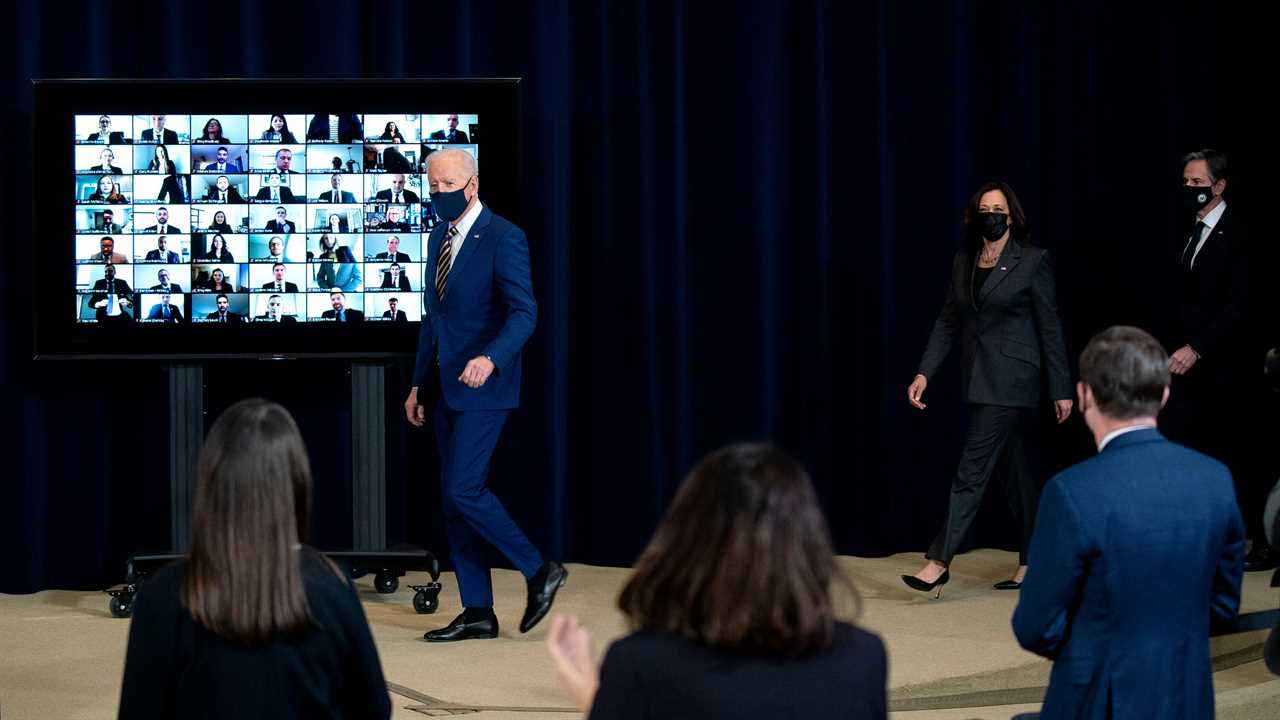
WASHINGTON — Pledging to rebuild international alliances and bolster the United States’ moral standing, President Biden on Thursday outlined plans to “re-engage the world.”
But first, he sought to win over the diplomats whose job it is to carry out his vision.
With State Department employees tuning in from around the country and overseas, Mr. Biden promised “to have your back” in a speech directed at career diplomats and Civil Service staff members who struggled under President Donald J. Trump to promote American values abroad while they were under assault at home.
Mr. Biden acknowledged as much. “This has been a difficult few years,” he said in a short address delivered in an auditorium of about 50 masked employees at the State Department headquarters in Washington.
But, he said, “you are the face of America, and it matters.”
“You are the center of all that I intend to do,” the president said. “You are the heart of it.”
Yet some diplomats remained skeptical. Mr. Biden’s gesture was appreciated, they said, and his promises of empowering employees hit all the right notes.
But with political appointees beginning to fill the top ranks at the State Department, career diplomats who said they stuck it out during the Trump administration expressed frustration about being passed over by loyalists to Mr. Biden.
“Our diplomats have heard a lot about swagger and ethos in the past four years,” said Brett Bruen, a former Foreign Service Officer and a member of the Obama administration’s National Security Council. “What they really want is support and substance.”
He said he had spoken with diplomats and other former colleagues who were still at the department; they had expressed some disappointment with Mr. Biden’s speech, given that it did not address how to promote and elevate officials into more senior jobs. “While President Biden provided a pep talk,” Mr. Bruen said, “he did not come bearing any new plans.”
For some, the speech was a much-needed antidote to the distrust and dismissiveness of diplomats that had permeated the department under Rex W. Tillerson and Mike Pompeo, Mr. Trump’s secretaries of state.
Mr. Tillerson oversaw a purge that eventually cut about 1,000 employees from the State Department’s work force before he was forced out.
Mr. Pompeo had promised to restore “swagger” to the diplomatic corps, confounding employees who had more success in foreign affairs by being less confrontational. But he refused to support staff members who drew Mr. Trump’s ire or to refute the former president’s barb of the “Deep State Department.”
In the week since Mr. Biden’s secretary of state, Antony J. Blinken, was sworn in, the department has not yet released a list of staff members who are being placed in top jobs.
In its absence, former and current State Department employees have compiled a running tally of Mr. Biden’s political appointees, which was shared with The New York Times. It includes at least nine new deputy assistant secretaries of state and four senior advisers, out of dozens of posts available.
Some of them had previously worked at the department but left under Mr. Trump, only to return to more powerful positions that are also open to career diplomats.
While it is not particularly unusual for a president to install his supporters in key policy positions, Mr. Biden’s hires singe a staff that was already burned by Mr. Trump’s appointees, many of whom had little or no experience in diplomacy.
Ned Price, the department’s spokesman, told reporters on Tuesday that the number of political appointees who had been named to jobs so far represented “a very small sample size,” and that career staff members would be represented in the top ranks of leadership.
“You will see a number of respected career officials assume some of the most senior positions in this building,” Mr. Price said. “There’s no doubt about that.”
Several diplomats have also privately raised concerns about officials who have remained in senior jobs after appearing, in the view of some Foreign Service officers, to have not sufficiently defended the department under Mr. Trump.
They include David Hale, the under secretary for political affairs, who accused diplomats of leaking information about Mr. Pompeo’s wife; and Carol Z. Perez, who, as the director general of the Foreign Service, did not publicly repudiate Mr. Trump’s removal of Marie L. Yovanovitch as the ambassador to Ukraine after she raised doubts about the president’s leadership. Ms. Perez is currently the department’s acting under secretary for management.
In his speech, Mr. Biden said he required integrity, transparency and accountability from his diplomats “to rebuild trust in America and around the world.”
He also said he would ensure that the department’s work force would reflect “diversity, equity, inclusion,” echoing a goal that Mr. Blinken has said he considers a benchmark for his own success. Many fewer women and people of color are promoted to senior-level career jobs in what has been described as a “pale, male and Yale” culture at the State Department.
In his own speech to employees last week, Mr. Blinken pledged to rebuild the department as “truly representative of the American people.”
That Mr. Blinken started his own career at the State Department has not gone unnoticed by employees, and his message has resonated with many diplomats who have felt overlooked or sidelined in previous years.
Mr. Blinken noted on Thursday the mosaic of the faces of 165 diplomats — the newest class of Foreign Service officers — who attended the president’s speech via video call and could be seen on screens placed onstage.
“These women and men represent the extraordinary talent and diversity of America,” Mr. Blinken said. “They’re the future of this department. We’re thrilled that they have joined our team.”
Michael Crowley contributed reporting.
Did you miss our previous article...
https://trendinginthenews.com/usa-politics/house-exiles-marjorie-taylor-greene-from-panels-as-republicans-rally-around-her






